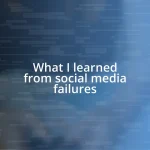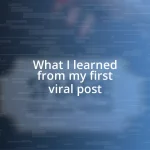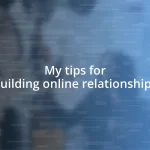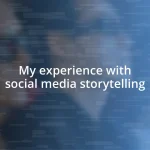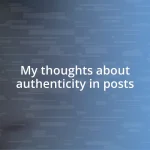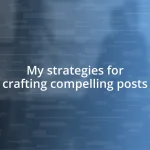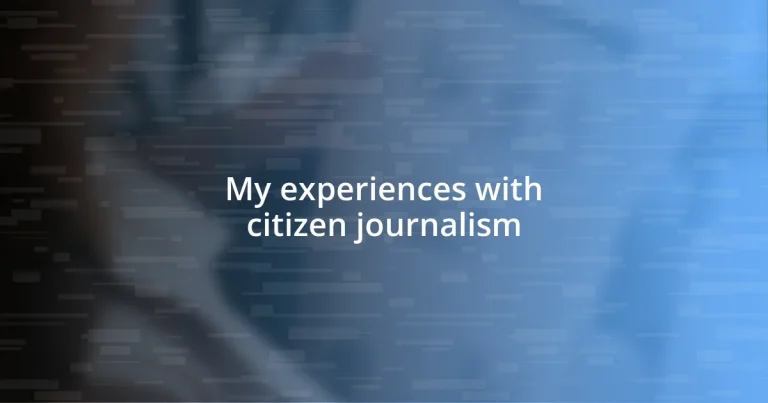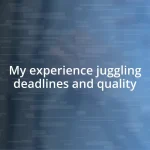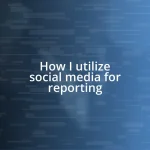Key takeaways:
- Citizen journalism empowers ordinary individuals to influence public discourse and share personal narratives, fostering community engagement and accountability.
- Participation in local events, such as protests and elections, reveals the profound impact of collective storytelling on community ties and diverse perspectives.
- The future of citizen journalism lies in integrating ethical standards with grassroots efforts, enhancing credibility while amplifying voices to drive social change.
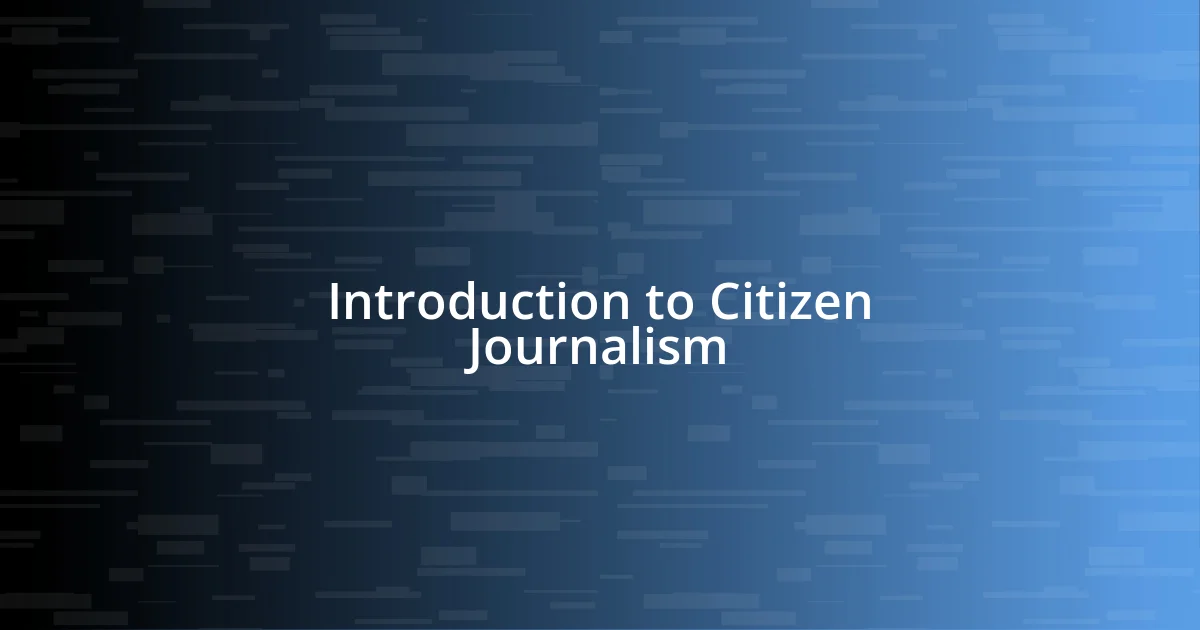
Introduction to Citizen Journalism
Citizen journalism has emerged as a powerful force in today’s digital era, transforming how news is created and consumed. I remember the first time I stumbled upon a live stream of a local protest on social media; it really struck me how quickly ordinary individuals could become reporters in their own right. Isn’t it fascinating to think about how technology has levelled the playing field?
What truly draws me to citizen journalism is the raw authenticity it often brings to the news narrative. When I participated in a community event and shared my firsthand experience via a blog post, the responses I received were overwhelmingly supportive, illustrating the impact that personal stories can have. Have you ever thought about the emotional weight behind a story told by someone who experienced it?
Emerging from the shadows of traditional journalism, citizen journalism invites everyone to participate in the storytelling process. I feel there’s an empowering aspect to this movement; it allows us, as regular individuals, to influence public discourse and hold power to account. Isn’t it compelling to realize that each of us, with a smartphone in hand, has the potential to uncover and report the truths around us?
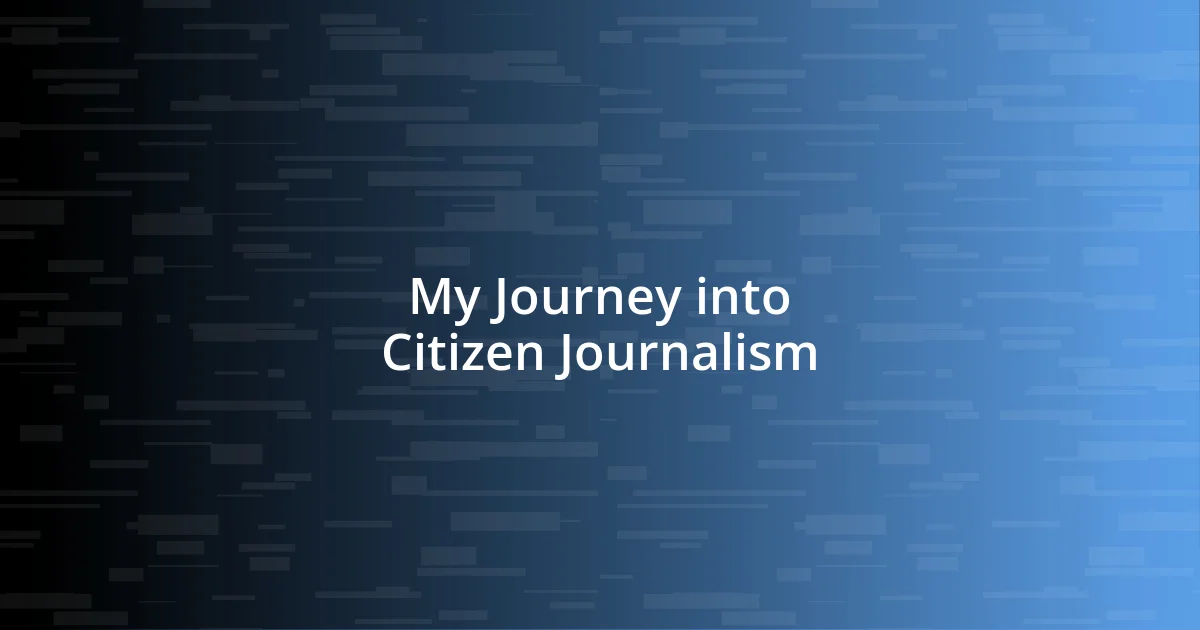
My Journey into Citizen Journalism
As I embarked on my journey into citizen journalism, the thrill of discovering a platform for my voice was undeniable. I remember standing in my neighborhood as a thunderstorm swept through, capturing the chaos on video and sharing it online. The flood of messages from friends and strangers alike made me realize how quickly a single narrative could resonate and mobilize others. Have you ever felt that rush of connection when your words strike a chord with someone else?
The turning point for me came when I covered a local election. Armed with notepad and camera, I approached voters outside the polling station. Their stories varied—some were excited, while others felt disillusioned. This experience opened my eyes to the power of ordinary voices in shaping public discourse. It was empowering to witness how each person’s perspective added depth to the election’s narrative. I genuinely felt like a part of something bigger than myself.
Moreover, I’ve found that the response to my articles often sparks fruitful discussions within my community. When I wrote about a local initiative to support businesses during tough times, the comments section overflowed with ideas and support. This feedback loop not only validates my efforts but also strengthens community ties. It’s thrilling to know that my small contribution can inspire others to take action or engage in meaningful dialogue.
| Experience | Impact |
|---|---|
| Local protests | Raised awareness and connected communities |
| Election coverage | Empowered voices and diversified narratives |
| Community initiatives | Inspired collaboration and conversation |
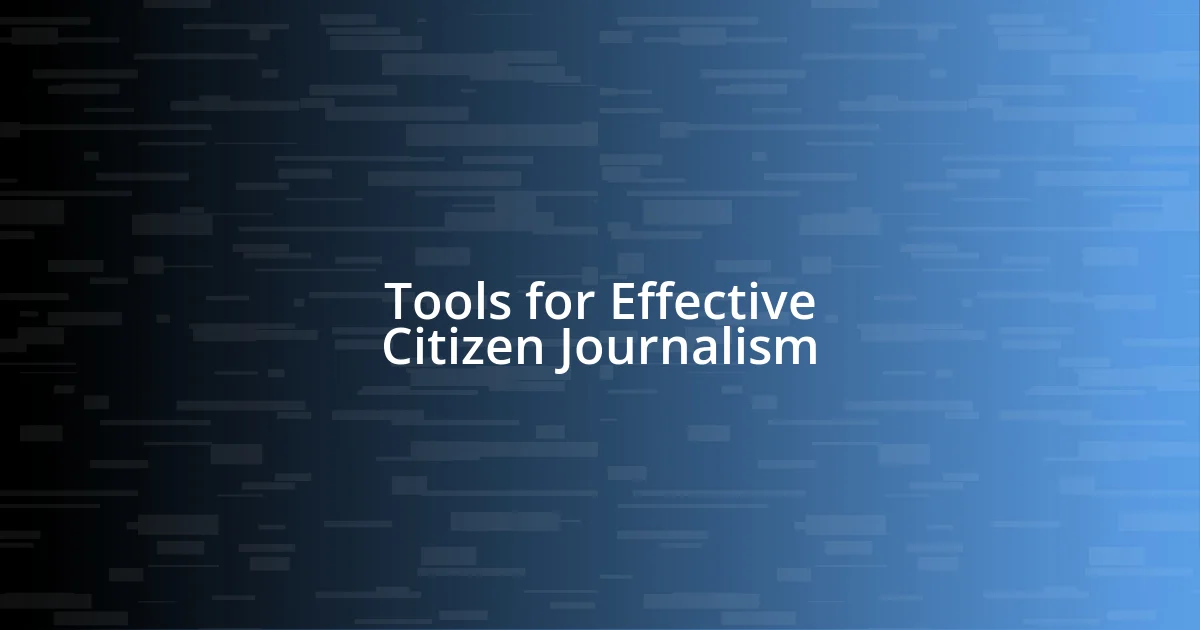
Tools for Effective Citizen Journalism
To delve into effective citizen journalism, I’ve found that the right tools can make all the difference. When I first started, I relied heavily on my smartphone. Little did I know that a simple device could elevate my storytelling. I remember capturing raw footage of a community gathering and, with a quick edit on an app, turning it into a compelling narrative that drew attention to local issues.
Here’s a list of tools that have been invaluable in my citizen journalism journey:
- Smartphone: For capturing photos, videos, and quickly sharing updates.
- Social Media Platforms: Crucial for engagement and instant feedback from your audience.
- Editing Apps: Tools like InShot or Canva help polish visuals for a professional touch.
- Blogging Platforms: Websites like WordPress or Medium provide spaces to develop and share longer narratives.
- Voice Recorders: Handy for interviews, capturing accurate quotes and emotions directly.
- Fact-Checking Tools: Services like Snopes or FactCheck.org help ensure credibility in what I share.
Using these tools has transformed my approach. It’s fascinating how technology can amplify personal stories and create meaningful dialogue. Each tool serves a purpose, allowing me to share impactful narratives that resonate with my audience.
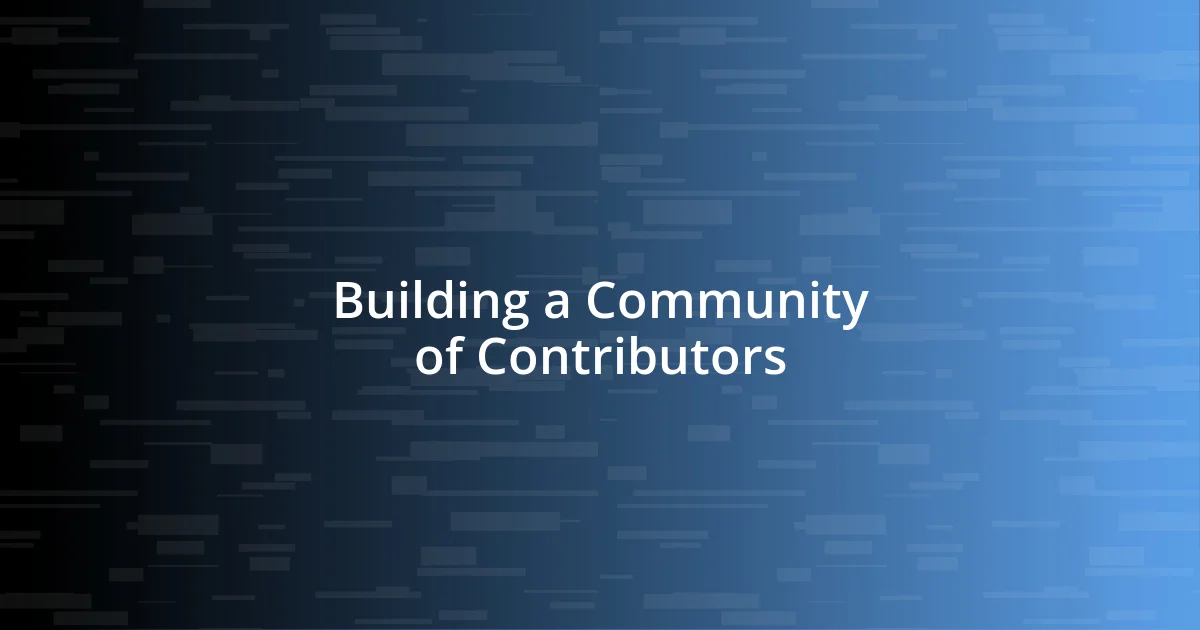
Building a Community of Contributors
Building a community of contributors has been one of the most rewarding aspects of my citizen journalism journey. I remember the first few times I reached out to friends and acquaintances, inviting them to share their stories. Each response felt like a small spark; I realized how many voices were eager to be heard but lacked the platform. Isn’t it fascinating how a simple invitation can lead to a flourishing exchange of experiences and insights?
As I continued to share my own stories, I noticed more people stepping forward to contribute their narratives. It was during a community cleanup event that I caught a glimpse of this collective effort. I brought my camera along to document the action, and soon, others joined in, sharing their experiences on social media. Watching the hashtag trend locally made me feel like we were creating something bigger together. What if every community generated such vibrant conversations? The impact could be profound!
Nurturing this community of contributors isn’t just about collecting stories; it’s also about fostering trust. I’ve learned that openly discussing the challenges faced by our community can inspire others to share their struggles and strengths. When I wrote about the difficulties small businesses encountered during the pandemic, many owners felt empowered to speak up about their experiences. It reinforced my belief that transparency and authenticity create a safe space for dialogue. Have you ever been part of a conversation that started small but grew into something significant? That’s the kind of energy we can cultivate within our communities.
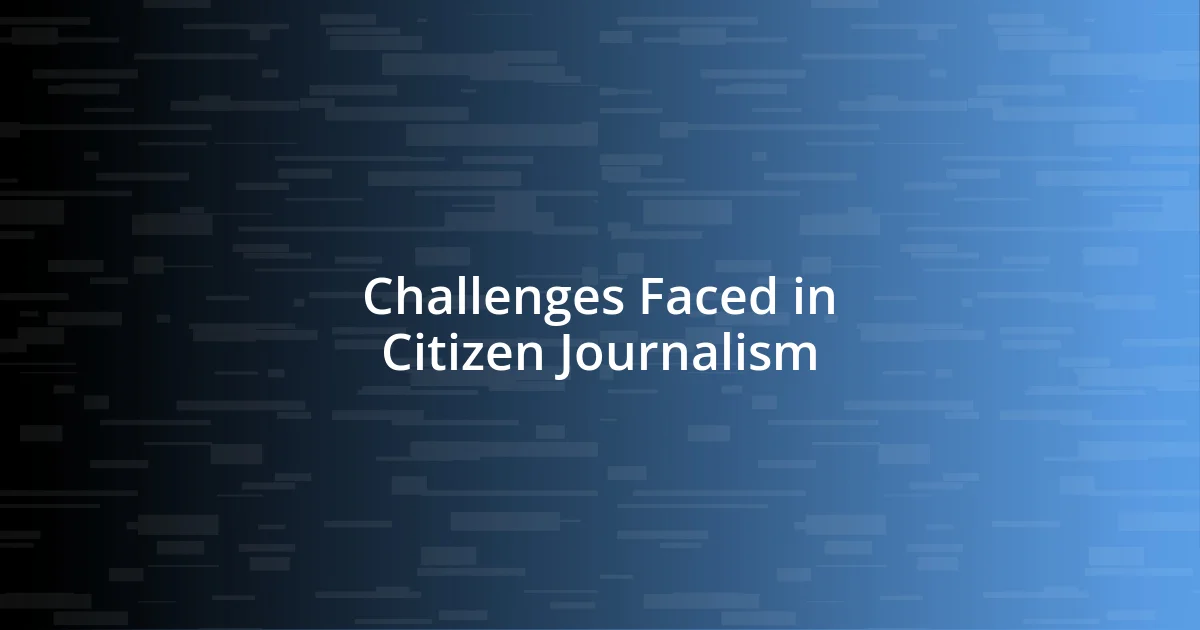
Challenges Faced in Citizen Journalism
One of the biggest hurdles I faced in citizen journalism was the challenge of accessing reliable information. In a world where anyone can post news, distinguishing fact from fiction often feels like a daunting task. I remember covering a local protest, and while many voices were eager to share their perspectives, sifting through conflicting reports to find the truth was overwhelming. Have you ever felt lost in a sea of information?
Another obstacle is the constant scrutiny that comes with sharing stories online. I’ve definitely felt the weight of negative feedback; putting your work out there can make you vulnerable. There was a piece I wrote about a controversial local development, and the backlash was intense. I had to remind myself that the goal is to spark conversation, even if it sometimes leads to discomfort. Isn’t it interesting how growth often occurs outside our comfort zones?
Lastly, time constraints can be a significant barrier for citizen journalists. Balancing a day job, family commitments, and community engagement often leaves little room for in-depth reporting. I recall evenings spent editing videos long into the night after my kids went to bed, wishing I had more hours in the day. Do you ever find yourself prioritizing passion projects over essential responsibilities? It’s a tricky balance to strike, but the rewards of sharing meaningful narratives keep me motivated.
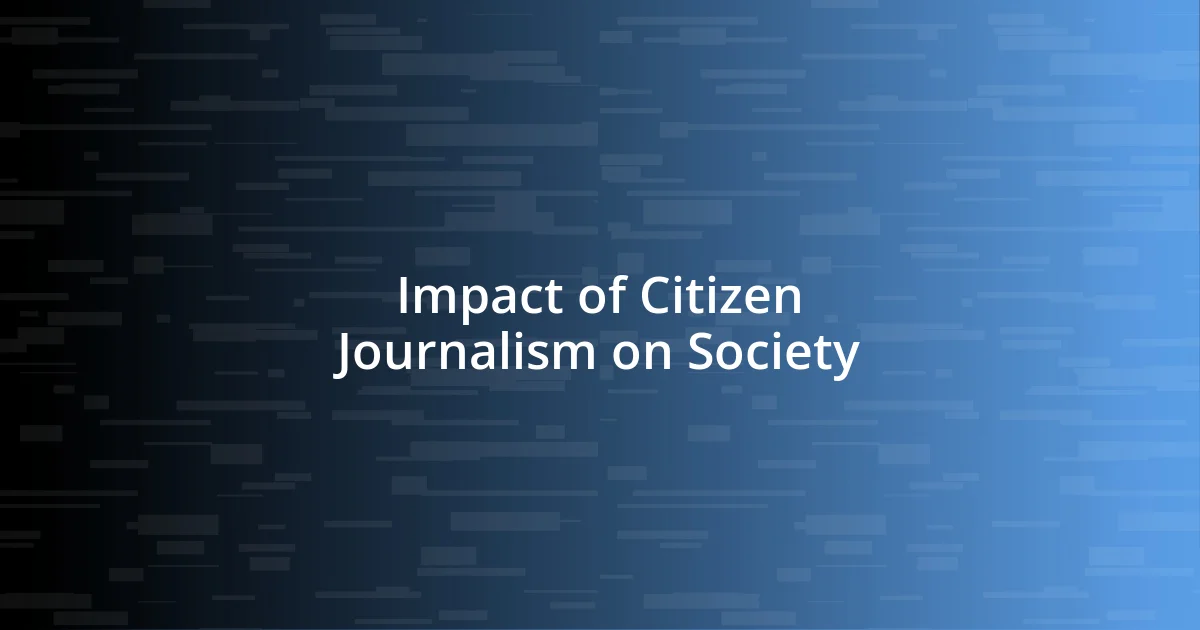
Impact of Citizen Journalism on Society
The impact of citizen journalism on society is incredibly profound. I remember attending a town hall meeting where a group of us shared real-time updates on social media. It was exciting to see how our posts sparked discussions among community members who couldn’t attend. This kind of engagement not only keeps people informed but also strengthens community ties. Have you ever witnessed a local issue gaining traction because voices from everyday citizens were amplified? It’s powerful to think about the change that can come from such grassroots efforts.
In my experience, one of the most significant effects of citizen journalism is how it empowers individuals. I recall when a friend used her smartphone to document local environmental concerns that often went unreported. The traction her video gained not only caught the attention of local authorities but also inspired others to be more vocal about issues affecting them. Isn’t it invigorating to realize that anyone with a story and a device can instigate change? I firmly believe this sense of agency fosters a culture of citizenship that encourages vigilance and accountability.
Furthermore, the emotional resonance of citizen journalism can’t be overstated. When I shared a piece about my neighbor’s experiences facing eviction, it struck a chord with many in our community. Questions of justice and empathy arose in conversations that followed, urging people to consider the human side of issues often relegated to statistics. Have you ever felt that collective urgency to act after hearing someone’s story? It illustrates how sharing personal narratives can transform abstract problems into relatable challenges, ultimately driving action and fostering a more engaged society.
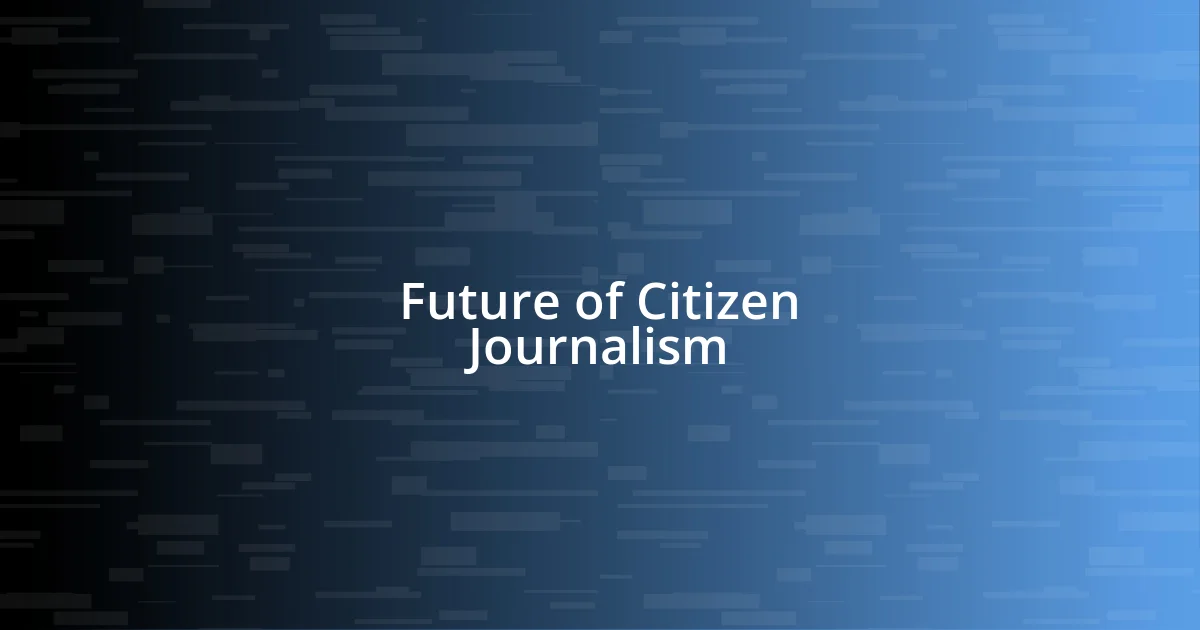
Future of Citizen Journalism
As I look ahead, the future of citizen journalism feels incredibly promising, yet still filled with challenges. I’ve often wondered how technology will shape our storytelling roles. For instance, as more people gain access to smartphones and social media, collaboration among citizen journalists could create a more dynamic platform for sharing local stories. Can you imagine a world where every community creates its own news narrative? It’s exhilarating to think about the potential connections we could forge.
I truly believe that integrating formal journalism standards with citizen efforts will be crucial moving forward. In my journey, I’ve learned that while anyone can share a story, accuracy and ethical considerations matter. One time, I collaborated with a more experienced journalist to fact-check my reporting on a community health issue. It was enlightening and highlighted the value of mentorship. Have you ever considered how valuable that relationship could be in ensuring credible reporting in our evolving landscape?
Looking to the future, I find myself reflecting on the role of citizen journalism in holding powerful entities accountable. I remember attending a community forum where we discussed the need for transparency in local government decisions. Engaging with my neighbors in that space reinforced the idea that when more voices join forces, we’re better equipped to ask tough questions. Isn’t it empowering to think that each of us can shine a light on the truth? In this way, citizen journalism can evolve into a formidable force for social change, one story at a time.




